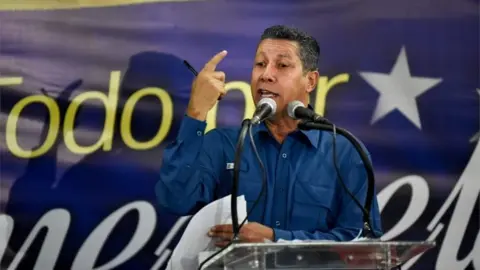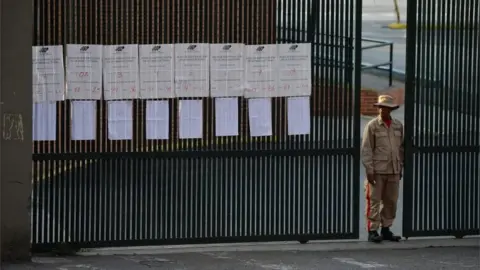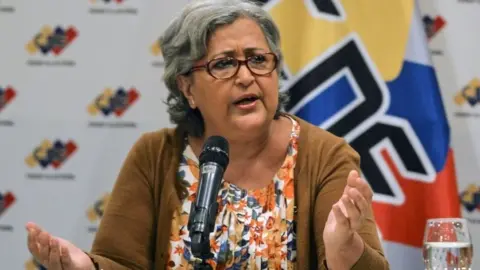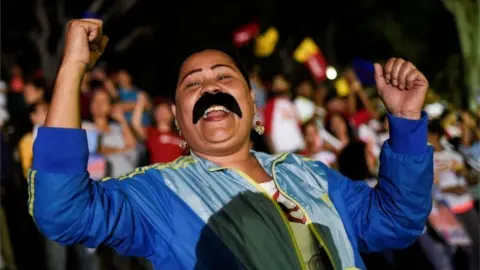Venezuela election: Maduro wins second term amid claims of vote rigging
Venezuela's President Nicolás Maduro has won re-election to another six-year term, in a vote marred by an opposition boycott and claims of vote-rigging.
Amid food shortages stemming from a severe economic crisis turnout was low.
The National Electoral Council (CNE) put it at just 46% but the opposition alleges it was even lower.
The main opposition candidate, Henri Falcón, rejected the result soon after the polls closed and called for new elections.
 AFP
AFP"We do not recognise this electoral process as valid... we have to have new elections in Venezuela," he said.
What's the result?
With more than 90% of the votes counted, Mr Maduro had 67.7% - 5.8 million votes - CNE chief Tibisay Lucena announced. Mr Falcón had won 21.2% - 1.8 million votes - she said.
Why is there a row about the turnout?
With Venezuela's main opposition coalition boycotting the election, a win by President Maduro had been widely expected. What observers were more interested in was to see how many Venezuelans would turn out to vote.
 AFP
AFPThe CNE said turnout would probably rise to 48%, still well below the figure in the 2013 presidential election, when almost 80% of eligible voters cast their ballots.
The opposition, however, accused the CNE of inflating its figures and claimed the real number was closer to 30%. A source within the CNE told Reuters that only 32.3% of eligible voters had cast their ballot by 18:00 local time, when most voting stations closed.
Can the CNE figures be trusted?
Under the Venezuelan constitution, the CNE is the official independent body responsible for overseeing and guaranteeing the transparency of all elections.
 AFP
AFPIt is made up of five members. The opposition alleges that four of the five are government stooges and therefore does not trust the body to be independent.
Luis Emilio Rondón, the one CNE member which has been critical of the government, said he did not recognise the results because "Venezuelans' freedom to vote" had not been respected.
What was President Maduro's reaction?
Mr Maduro and his supporters were jubilant. The 55 year old told cheering crowds outside the presidential palace in Caracas that "the revolution is here to stay!".
 AFP
AFPHis supporters chanted "let's go, Nico!" as fireworks went off and confetti was fired in the air.
He also mocked his main rival, Mr Falcón, saying he had been left "groggy" by the knockout victory Mr Maduro had achieved.
And while on the one hand he called for dialogue with the opposition, he also told supporters that "the opposition must leave us alone to govern".
Previous attempts at dialogue between the opposition and the government have failed.
Why is the opposition crying foul?
The main opposition coalition had warned that the election would not be free and fair.
It said the poll had been brought forward from December 2018 to take advantage of disarray within opposition ranks and that some of the most promising candidates had been banned from standing or jailed, while many others had fled the country.
That is why it called for a boycott. Mr Falcón however broke ranks, arguing Venezuelans should be given a chance to vote Mr Maduro out of office.
But following the vote, he too alleged it had been rigged in Mr Maduro's favour, by abuse of the scanning of state-issued benefits cards used for accessing food. He has called for a rerun.

How did people react in Venezuela?
By Katy Watson, BBC South America correspondent, Caracas
Such was the expectation that Nicolás Maduro would win that his rivals admitted defeat, denouncing the result before it had even been announced. There was never going to be any result other than a Maduro victory - and Venezuelans knew that.
It feels like most people here are no longer outraged. Disappointed, maybe, but it's par for the course in a country where political freedom feels increasingly limited.
Mr Maduro has promised change in Venezuela - why he needed a second mandate to do that is anyone's guess. He's already been in the job five years. Added to that, change for the better under Mr Maduro is unlikely. With international pressure likely to build after these results, and with a crumbling economy, his job is harder than ever - as are the lives of Venezuelans.

What has the international reaction been?
As polling started, US Secretary of State Mike Pompeo denounced the election as a "sham" on Twitter.
Allow X content?
The US mission to the United Nations called the process an "insult to democracy" and Chile and Panama said that they would not recognise the result.
El Salvador and Cuba, on the other hand, congratulated President Maduro on his election win.
What next?
All eyes are now on the US to see whether it will impose sanctions on Venezuela's all-important oil sector, as it has threatened to do.
The European Union and Latin American countries had also warned ahead of the vote that they would take measures against the government if it went ahead with the election.
The exodus of Venezuelans leaving their country is expected to speed up further. According to International Office of Migration figures, the number of Venezuelans living abroad increased to an estimated 1.6 million in 2017 from 700,000 in 2015.
They have been driven out by Venezuela's severe economic crisis which has led to shortages of food and medicine and the world's highest inflation rate.
Those leaving speak of the struggle to feed their families and growing levels of child malnutrition which have hit 70% in some rural areas.
